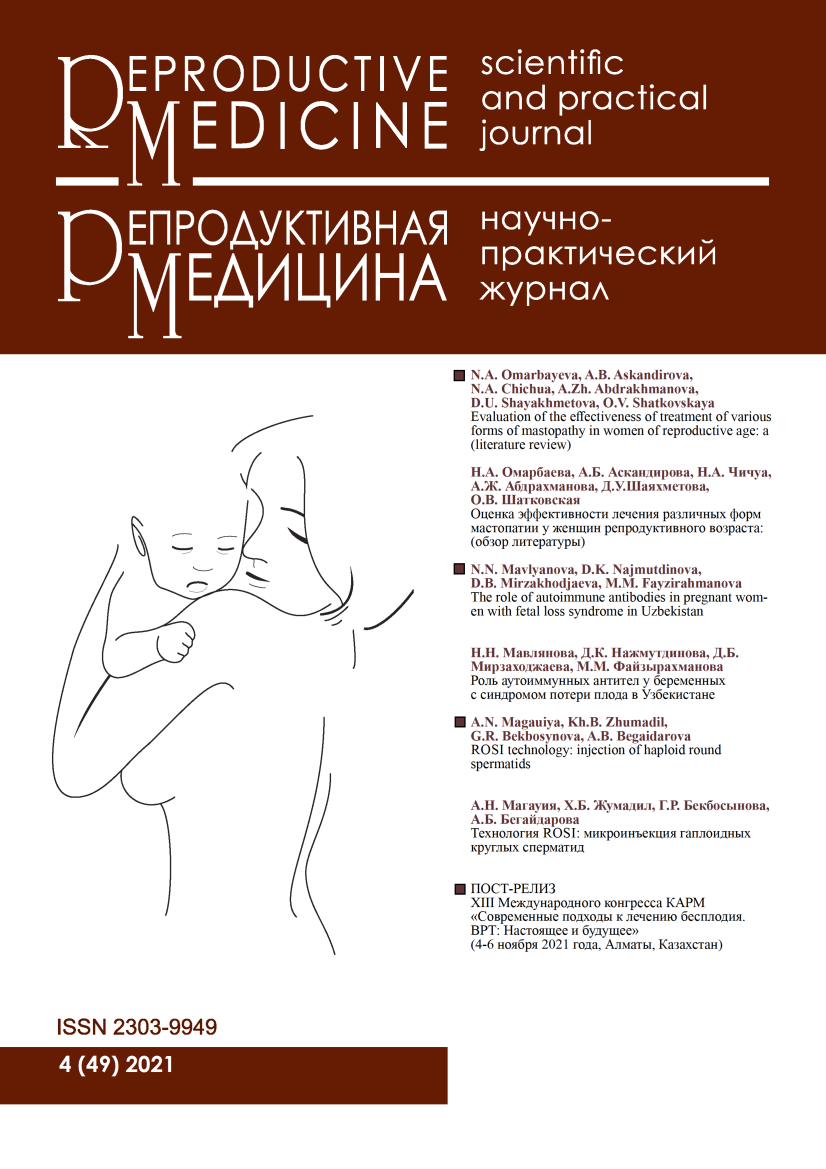Ongoing pregnancy in a couple with nonmosaic klinefelter syndrome after IVF program: a clinical case
DOI:
https://doi.org/10.37800/RM.4.2021.59-65Keywords:
nonmosaic Klinefelter syndrome, pregnancy, in vitro fertilization (IVF), intracytoplasmic sperm injection (ICSI), azoospermia, hypergonadotropic hypogonadismAbstract
Relevance: Klinefelter syndrome is a congenital genetic disease in males due to an additional one or more X chromosomes in the karyotype and is characterized by the absence of sperm in the ejaculate (azoospermia). With the advent of assisted reproductive technologies and the introduction of microsurgical operations such as microdissection testicular sperm extraction (micro-TESE), pregnancy has become more accessible for this category of patients.
The purpose of the study is to present a clinical case of pregnancy in the spouse of a patient with nonmosaic Klinefelter syndrome.
Methods: The article describes a clinical case of a successful conception from a man with nonmosaic Klinefelter syndrome after in-vitro fertilization by intracytoplasmic sperm injection (ICSI) method with subsequent preimplantation genetic testing of embryo aneuploidy (PGT-A) through comparative genomic hybridization (array-CGH). Presumably, this is the first case in Kazakhstan described in the literature.
Results: At the time of submission of the article, the wife of a patient with nonmosaic Klinefelter syndrome has a developing uterine singleton pregnancy for 30-31 obstetric weeks.
Conclusion: The development of assisted reproductive technologies, the introduction of micro-TESE in urology made it possible for a patient with the genetic disease – Klinefelter syndrome – to become a biological father. According to the studies, the percentage of healthy children born in such patients reaches 28% worldwide, and their total number already exceeds 150.
References
Беспалюк Д.А., Чугунов И.С. Синдром Клайнфельтера у детей и подростков // Проблемы эндокринологии. – 2018. – Том 64. – №5. – С. 321-328 [Bespalyuk D.A., Chugunov I.S. Sindrom Klajnfel'tera u detej i podrostkov // Problemy e'ndokrinologii. – 2018. – Tom 64. – №5. – S. 321-328 (in Russian)]. https://doi.org/10.14341/probl9840;
Аль-Шукри С.Х., Гзгзян А.М., Боровец С.Ю., Белоусов В.Я., Торопов В.А. Прогностическая значимость микроделеций локусов AZF и синдрома Клайнфельтера у мужчин с азооспермией в отношении результативности биопсии яичка и исходов вспомогательных репродуктивных технологий (обзор литературы) // Нефрология. – 2016. – Том 20. – №4. – С. 40-46 [Al'-Shukri S.X., Gzgzyan A.M., Borovec S.Yu., Belousov V.Ya., Toropov V.A. Prognosticheskaya znachimost' mikrodelecij lokusov AZF i sindroma Klajnfel'tera u muzhchin s azoospermiej v otnoshenii rezul'tativnosti biopsii yaichka i isxodov vspomogatel'nyx reproduktivnyx texnologij (obzor literatury) // Nefrologiya. – 2016. – Tom 20. – №4. – S. 40-46 (in Russian)]. https://elibrary.ru/download/elibrary_26901839_27428109.pdf;
Groth K.A., Skakkebæk A., Høst C., Gravholt C.H., Bojesen A. Clinical review: Klinefelter syndrome — a clinical update // J. Clin. Endocrinol. Metab. – 2013. – Vol. 98(1). – P. 20-30. https://doi.org/10.1210/jc.2012-2382;
Андрология. Мужское здоровье и дисфункция репродуктивной системы / под ред. Э. Нишлага, Г. Бере. – М.: Медицинское информационное агентство, 2005. – 554 с. [Andrologiya. Muzhskoe zdorov'e i disfunkciya reproduktivnoj sistemy / pod red. E'. Nishlaga, G. Bere. – M.: Medicinskoe informacionnoe agentstvo, 2005. – 554 s. (in Russian)]. ISBN: 5-89481-236-4. https://medbook.ru/books/364;
Ширшов В.Н. Современное состояние проблемы мужского бесплодия: обзор клинических рекомендаций европейской ассоциации урологов // Клиническая практика. – 2016. – Т. 7. – №1. – C. 39-50. [Shirshov V.N. Sovremennoe sostoyanie problemyi muzhskogo besplodiya: obzor klinicheskih rekomendatsiy evropeyskoy assotsiatsii urologov // Klinicheskaya praktika. – 2016. – Т. 7. – №1. – S. 39-50 (in Russian)]. https://www.researchgate.net/publication/323942073_CURRENT_STATE_OF_THE_MALE_INFERTILITY_PROBLEMTHE_REVIEW_OF_EUROPEAN_ASSOCIATION_OF_UROLOGY_CLINICAL_GUIDELINES;
Aksglaede L., Link K., Giwercman A., Jørgensen N., Skakkebaek N.E., Juul A. 47, XXY Klinefelter syndrome: clinical characteristics and age-specific recommendations for medical management // Am. J. Med. Genet. C. Semin. Med. Genet. – 2013. – Vol. 163C(1). – P. 55-63. https://doi.org/10.1002/ajmg.c.31349;
Ozer C., Caglar Aytac P., Goren M.R., Toksoz S., Gul U., Turunc T. Sperm retrieval by microdissection testicular sperm extraction and intracytoplasmic sperm injection outcomes in nonobstructive azoospermic patients with Klinefelter syndrome // Andrologia. – 2018. 10.1111/and.12983. Advance online publication. https://doi.org/10.1111/and.12983;
Palermo G.D., Schlegel P.N., Scott Sills E., Veeck L.L., Zaninovic N., Menendez S., Rosenwaks Z. Births after intracytoplasmic injection of sperm obtained by testicular extraction from men with nonmosaic Klinefelter’s syndrome // N. Engl. J. Med. – 1998. – Vol. 338. – P. 588-590. https://doi.org/10.1056/NEJM199802263380905;
Corona G., Pizzocaro A., Lanfranco F., Garolla A., Pelliccione F., Vignozzi L., Ferlin A., Foresta C., Jannini E.A., Maggi M., Lenzi A., Pasquali D., Francavilla S., Klinefelter ItaliaN Group (KING). Sperm recovery and ICSI outcomes in Klinefelter syndrome: a systematic review and meta-analysis // Hum. Reprod. Update. – 2017. – Vol. 23(3). – P. 265-275. https://doi.org/10.1093/humupd/dmx008;
Chen X., Ma Y., Zou S., Wang S., Qiu J., Xiao Q., Zhou L., Ping P. Comparison and outcomes of nonobstructive azoospermia patients with different etiology undergoing MicroTESE and ICSI treatments // Transl. Androl. Urol. – 2019. – Vol. 8(4). – P. 366-373. https://dx.doi.org/10.21037/tau.2019.04.08;
Cryopreservation of oocytes // In: Fertility Cryopreservation/eds. R. Chian, P. Quinn. – Cambridge: Cambridge University Press, 2010. – Pp. 114-188. https://doi.org/10.1017/CBO9780511730207.015;
Воронцова М.В., Калинченко Н.Ю. Синдром Клайнфельтера: обзор литературы по использованию современных методов вспомогательных репродуктивных технологий // Проблемы эндокринологии. – 2020. – Т. 66(6). – С. 31-38 [Vorontsova M.V., Kalinchenko N.Yu. Sindrom Klaynfeltera: obzor literaturyi po ispolzovaniyu sovremennyih metodov vspomogatelnyih reproduktivnyih tehnologiy // Problemyi endokrinologii. – 2020. – T. 66(6). – S. 31-38. (in Russian)]. https://www.probl-endojournals.ru/jour/article/view/12666/9871.
Additional Files
Published
How to Cite
Issue
Section
License
The articles published in this Journal are licensed under the CC BY-NC-ND 4.0 (Creative Commons Attribution – Non-Commercial – No Derivatives 4.0 International) license, which provides for their non-commercial use only. Under this license, users have the right to copy and distribute the material in copyright but are not permitted to modify or use it for commercial purposes. Full details on the licensing are available at https://creativecommons.org/licenses/by-nc-nd/4.0/.




